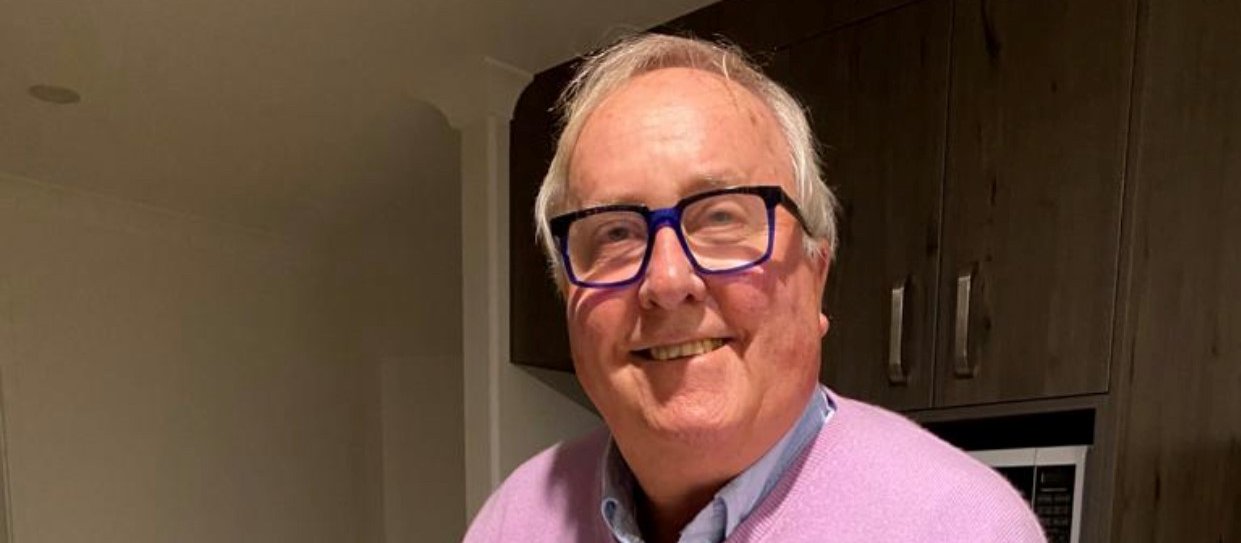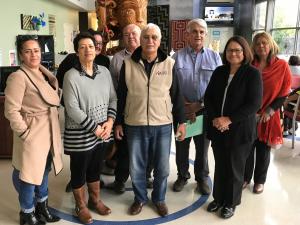Respiratory physician Lutz Beckert considers chronic obstructive pulmonary disease management, including the prevention of COPD, the importance of smoking cessation and pulmonary rehabilitation, and the lifesaving potential of addressing treatable traits. He also discusses the logic of inhaler therapy, moving from single therapy to dual and triple therapy when indicated, as well as other aspects of management
Celebrating a rare and highly respected health leader
Celebrating a rare and highly respected health leader

By Local Democracy Reporter Alisha Evans
A former Western Bay of Plenty health boss who was influential in Māori health is being remembered for the legacy he created.
Robin Milne, who was on the board of Ngā Mataapuna Oranga PHO, died in April.
Milne started at Tauranga Hospital as chief operating officer in the early 1990s. He was recruited by Dr Lester Levy and became chief executive in 1993 when the government reformed the health system.
The area health boards were reconfigured into 23 Crown Health Enterprises (CHEs). One CHE was called Western Bay of Plenty Health and Milne was placed at its head.
Members of his executive team, known as the “tight five”, have shared their experiences.
“He was a great support for the advancement of Māori health,” said Janice Kuka, one of his executive team.
“His legacy still lives. The [Kaupapa Māori] ward is still there. Māori staff still remember him, and they've gone on to be national leaders.”
In the early 1990s, the community and iwi were “dissatisfied about the revolving door that was happening with Māori health”, so lobbied hospital management for a kaupapa Māori unit to be established, said Kuka.
Milne, Kuka and the rest of the executive team supported Māori to establish Te Puna Hauora which led to the Kaupapa Māori ward being set up at the hospital.
“He wasn't the only one, but he was very influential in how it all began.”
The Kaupapa Māori ward was a first for Aotearoa and has not been replicated anywhere else in the country, said Kuka.
The ward is open to anyone and took a holistic Māori approach to caring for people, so there was spiritual support available and whānau were accommodated as well, she said.
“Our nurses were trained to look after the whole person. It’s been really successful both for Māori and non-Māori.
“He was highly respected by us [Māori] because he was courageous in supporting us.
“We think that was a big part of the structural change in addressing Māori health.”
Now the managing director of Ngā Mataapuna Oranga, Kuka said Milne continued working for Māori Health right up until he died.
Geoff Smith, former human resources manager for WBOP Health, gets emotional when asked his thoughts on his previous boss.
“[He was] very rare and very special”.
Smith said Milne “started from scratch” with his executive team and head hunted them all to run the hospital and its 4000 staff.
“The staff referred to us as the tight five.”
On Milne’s leadership style, Smith said: “He enabled and trusted. He was clear about what the vision should be, what we were trying to achieve.”
Milne felt the hospital should be a place where staff were happy to come and felt their contribution was valued, said Smith.
Former WBOP Health customer services manager Alyson Howell said Milne was the “right man for the times” because he was able to balance the business approach required with empathy for patients.
She gave the example of James Lynch, who was in the hospital for 44 years after an electrocution at the age of 14 left him severely disabled.
Lynch came into the hospital’s care in 1957 after his body's motor functions deteriorated, eventually dying there in 2001, aged 84.
Pressure was placed on Milne by various authorities to find Lynch alternative care because hospitals were for acutely unwell people, said Howell.
“Robin didn't want him [Lynch] to go somewhere else, because he said: ‘people understand him here, this is his home’.
“He was quite a remarkable leader, very insightful, very dedicated to making the health service that he ran as inclusive and as fair as possible for patients, staff, the community, and [patient's] families.”
After leaving Western Bay of Plenty Health in 1997 Milne became a consultant, but the “tight five” remained friends.
Kuka said he was “very understated”, and they didn’t realise how much he had achieved until they got together and talked about it.
Howell said her colleagues from that time have told her: “What they learned from Robin, they continue to do in the businesses that they work in today. That he influenced their leadership style, which is pretty fantastic.”
In his later years, the doting grandfather took up drawing and set up a mini gallery at one of his favourite cafés in Te Puna.
“He was very proud to display his latest pics and would have them on rotation,” said his daughter Georgie Milne.
He called Ōmokoroa home and loved it almost as much as his three “treasured” grandchildren, Portia, Boston and EvaRose, she said.
Described as warm and having a great sense of humour, Milne died suddenly at home on April 28, aged 75.
One of the “tight five”, Sue Lewer organised a remembrance gathering.
Lewer said Milne was a lively character. “…he was very thoughtful, but he loved to laugh. He would find humour in some really challenging situations.”
Local Democracy Reporting is public interest journalism funded through New Zealand On Air








![Barbara Fountain, editor of New Zealand Doctor Rata Aotearoa, and Paul Hutchison, GP and senior medical clinician at Tāmaki Health [Image: Simon Maude]](/sites/default/files/styles/thumbnail_cropped_100/public/2025-03/Barbara%20Fountain%2C%20editor%20of%20New%20Zealand%20Doctor%20Rata%20Aotearoa%2C%20and%20Paul%20Hutchison%2C%20GP%20and%20senior%20medical%20clinician%20at%20T%C4%81maki%20Health%20CR%20Simon%20Maude.jpg?itok=-HbQ1EYA)
![Lori Peters, NP and advanced health improvement practitioner at Mahitahi Hauora, and Jasper Nacilla, NP at The Terrace Medical Centre in Wellington [Image: Simon Maude]](/sites/default/files/styles/thumbnail_cropped_100/public/2025-03/2.%20Lori%20Peters%2C%20NP%20and%20advanced%20HIP%20at%20Mahitahi%20Hauora%2C%20and%20Jasper%20Nacilla%2C%20NP%20at%20The%20Terrace%20Medical%20Centre%20in%20Wellington%20CR%20Simon%20Maude.jpg?itok=sUfbsSF1)
![Ministry of Social Development health and disability coordinator Liz Williams, regional health advisors Mary Mojel and Larah Takarangi, and health and disability coordinators Rebecca Staunton and Myint Than Htut [Image: Simon Maude]](/sites/default/files/styles/thumbnail_cropped_100/public/2025-03/3.%20Ministry%20of%20Social%20Development%27s%20Liz%20Williams%2C%20Mary%20Mojel%2C%20Larah%20Takarangi%2C%20Rebecca%20Staunton%20and%20Myint%20Than%20Htut%20CR%20Simon%20Maude.jpg?itok=9ceOujzC)
![Locum GP Helen Fisher, with Te Kuiti Medical Centre NP Bridget Woodney [Image: Simon Maude]](/sites/default/files/styles/thumbnail_cropped_100/public/2025-03/4.%20Locum%20GP%20Helen%20Fisher%2C%20with%20Te%20Kuiti%20Medical%20Centre%20NP%20Bridget%20Woodney%20CR%20Simon%20Maude.jpg?itok=TJeODetm)
![Ruby Faulkner, GPEP2, with David Small, GPEP3 from The Doctors Greenmeadows in Napier [Image: Simon Maude]](/sites/default/files/styles/thumbnail_cropped_100/public/2025-03/5.%20Ruby%20Faulkner%2C%20GPEP2%2C%20with%20David%20Small%2C%20GPEP3%20from%20The%20Doctors%20Greenmeadows%20in%20Napier%20CR%20Simon%20Maude.jpg?itok=B0u4wsIs)
![Rochelle Langton and Libby Thomas, marketing advisors at the Medical Protection Society [Image: Simon Maude]](/sites/default/files/styles/thumbnail_cropped_100/public/2025-03/6.%20Rochelle%20Langton%20and%20Libby%20Thomas%2C%20marketing%20advisors%20at%20the%20Medical%20Protection%20Society%20CR%20Simon%20Maude.jpg?itok=r52_Cf74)
![Specialist GP Lucy Gibberd, medical advisor at MPS, and Zara Bolam, urgent-care specialist at The Nest Health Centre in Inglewood [Image: Simon Maude]](/sites/default/files/styles/thumbnail_cropped_100/public/2025-03/7.%20Specialist%20GP%20Lucy%20Gibberd%2C%20medical%20advisor%20at%20MPS%2C%20and%20Zara%20Bolam%2C%20urgent-care%20specialist%20at%20The%20Nest%20Health%20Centre%20in%20Inglewood%20CR%20Simon%20Maude.jpg?itok=z8eVoBU3)
![Olivia Blackmore and Trudee Sharp, NPs at Gore Health Centre, and Gaylene Hastie, NP at Queenstown Medical Centre [Image: Simon Maude]](/sites/default/files/styles/thumbnail_cropped_100/public/2025-03/8.%20Olivia%20Blackmore%20and%20Trudee%20Sharp%2C%20NPs%20at%20Gore%20Health%20Centre%2C%20and%20Gaylene%20Hastie%2C%20NP%20at%20Queenstown%20Medical%20Centre%20CR%20Simon%20Maude.jpg?itok=Z6u9d0XH)
![Mary Toloa, specialist GP at Porirua and Union Community Health Service in Wellington, Mara Coler, clinical pharmacist at Tū Ora Compass Health, and Bhavna Mistry, specialist GP at Porirua and Union Community Health Service [Image: Simon Maude]](/sites/default/files/styles/thumbnail_cropped_100/public/2025-03/9.%20Mary%20Toloa%2C%20Porirua%20and%20Union%20Community%20Health%20Service%20in%20Wellington%2C%20Mara%20Coler%2C%20T%C5%AB%20Ora%20Compass%20Health%2C%20and%20Bhavna%20Mistry%2C%20PUCHS%20CR%20Simon%20Maude.jpg?itok=kpChr0cc)